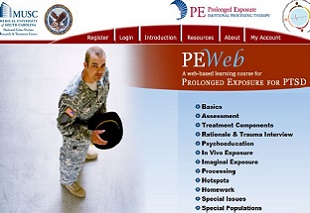PEWeb
Continuing Education
This section brings together free in-depth Continuing Education resources for the Professional community concerned with trauma.
PEWeb
- Date Created: 12/ 2/2014
- Time to Complete: 10 hours
- Credits: APA, CA BBS, NBCC, Other Orgs
- Skill Level: Intermediate

Description
PEWeb will be available in late 2025.
PEWeb is an online, interactive training program designed to teach mental health professionals how to implement Prolonged Exposure (PE) therapy. This collaborative site was developed by the Medical University of South Carolina, University of Pennsylvania and the National Center for PTSD.
This web-based course has particular focus on treatment of military and combat-related PTSD, although the principles and methods work well for any type of trauma that results in PTSD. PEWeb includes step-by-step instructions for each component of PE, printable scripts, and video demonstrations with expert clinicians.
NOTE: PEWeb is NOT sufficient training to deliver PE proficiently.
Goals and Objectives
- Learn about the basics of PTSD: prevalence, etiology, and diagnostic criteria.
- Learn about the theoretical foundation, development and common myths of PE.
- Review pre-treatment assessment and progress monitoring.
- Review PE treatment basics, including session content, audiotaping, and homework.
- Review active treatment components of PE: in vivo and imaginal exposure, psychoeducation and breathing retraining.
- Learn how to facilitate processing.
- Learn tips to build the therapeutic alliance.
This course is maintained on the Medical University of South Carolina website.

























